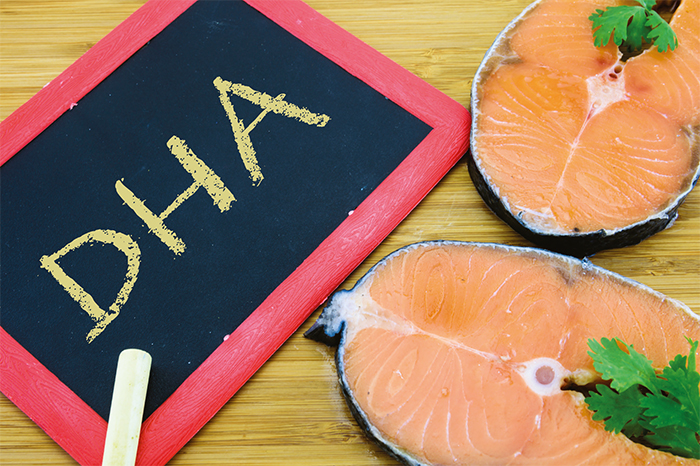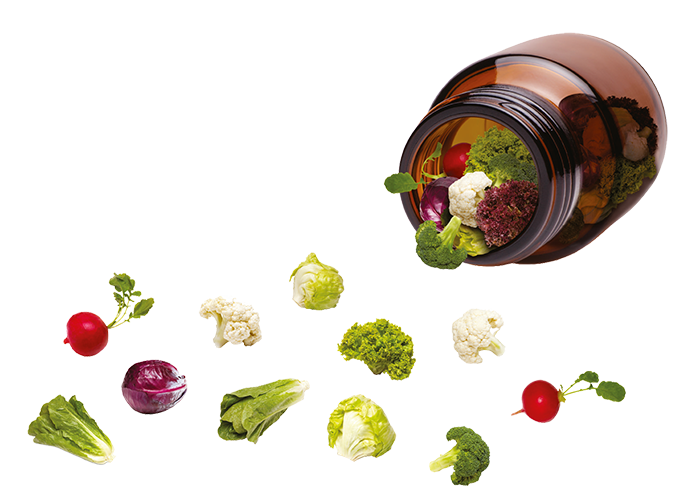Healthy headlines: helpful or hype?
In Conditions
Follow this topic
Bookmark
Record learning outcomes
With so many stories about nutrition and supplements, it's difficult to separate fact from fiction. We look at the research behind the headlines.

Hardly a day goes by when a story about nutrition doesn't hit the headlines. Food fads and miracle dietary supplements are hot topics. But with so much ongoing research, it can be a little overwhelming, not to mention confusing, for the general public.
And it's difficult to know if there's any reliable science behind the media hype. Here's a look at the research behind some recent nutrition headlines and which supplements it's worth pharmacy customers investing in.
Eating veg could reduce your breast cancer risk
Research behind the headline:
Researchers at the University of Missouri-Columbia looked at the relationship between vegetable consumption and breast cancer risk. Using human breast cancer cells, they discovered that luteolin (a flavonoid €“ type of nutrient €“ commonly found in fruit and vegetables) has several anti-tumour effects.
The research, which was published in the August 2015 issue of the journal Springer Plus, found that luteolin can reduce the development of new blood vessels that feed breast cancer cells and limit the ability of breast cancer cells to divide rapidly. The researchers then tested luteolin on laboratory mice with breast cancer and found similar effects. They concluded that with further research a new drug based on luteolin could be developed for more aggressive forms of breast cancer.
The facts:
According to Cancer Research UK, the link between diet and cancer is controversial, although fruit and vegetables may help to prevent some forms of the disease. Fruit and vegetables contain many different nutrients, including flavonoids, which could have a protective effect.
€Dietitians would encourage everyone to increase their vegetable consumption,€ says Dr Amanda Squire, registered dietitian and lecturer at Cardiff School of Health Sciences. €This generally reduces their intake of saturated fat and calories and leads to a more balanced diet. Fruit and vegetables have antioxidant properties, which can have a beneficial effect on all health conditions.€
Rich sources of luteolin include thyme, celery, parsley and broccoli. But further research is needed before doctors can recommend specific vegetables for cancer prevention. €This study is still very early research using cells and mice,€ says Jane Murphy, clinical nurse specialist at Breast Cancer Care.
€It's impossible to base any health advice on this. The most significant risk factor for breast cancer appears to be body weight, but this tends to show itself only after the menopause.€
Vitamin D pills don't improve bone health for postmenopausal women
Research behind the headline:
Researchers at the University of Wisconsin School of Medicine and Public Health in Madison looked at the relationship between vitamin D supplements and the bone health of postmenopausal women. They recruited 230 women (75 years or under) who were going through the menopause and had vitamin D deficiency and no osteoporosis. The women were randomly assigned to receive a high dose of vitamin D (50,000 IU/1.25mg), a lower dose of vitamin D (800 IU/20mcg) or placebo for a year.
The study, which was published in the online version of JAMA Internal Medicine in August 2015, found that high-dose vitamin D supplements increased the women's calcium absorption, but the effect was small and didn't improve their bone density or muscle mass. They concluded that the benefits of high-dose supplements were too small to justify their routine use in postmenopausal women. The lower-dose supplements had no more benefits than the placebo.
The facts:
Many people in the UK obtain all the vitamin D they need from sunlight and a few food sources (e.g. oily fish, eggs and fortified margarine/breakfast cereals). But according to the National Diet and Nutrition Survey, up to a quarter of people in the UK have low blood levels of vitamin D, which is essential for calcium absorption. People who don't get enough vitamin D have a greater risk of health problems, such as brittle bones.
Department of Health guidelines recommend that high-risk groups (e.g. the over-65s, pregnant/breastfeeding women and people who don't get much natural daylight) take a daily 10mcg vitamin D supplement. But there's no evidence that postmenopausal women need to take vitamin D supplements as well.
€At the menopause, a reduction on oestrogen affects bone's ability to renew itself,€ says Dr Squire. €The key message is that women need to have enough calcium and vitamin D together, by including low fat dairy products in their diet and getting outdoors. Vitamin D may make some contribution to bone health, but women also need calcium in the equation.€
This particular study used very high doses of vitamin D €“ even the lowest dose was double that recommended for highrisk groups in the UK. According to NHS Choices, taking too much vitamin D can lead to a build up of calcium, damaging the kidneys, or cause calcium to be removed from bones, softening and weakening them.
Eating fish could protect against depression
Research behind the headline:
Chinese researchers analysed 26 studies published between 2001 and 2014, 10 of which had been conducted in Europe. The studies included more than 150,000 people.
This research was published online in September 2015 in the Journal of Epidemiology and Community Health and found that people who consumed the most fish had a 17 per cent reduced risk of depression than those who ate the least, but this was only relevant in the European studies. More research is needed to see why fish (and which types of fish) may have a protective effect.
The facts:
According to the British Dietetic Association, some researchers believe that omega-3 fatty acids (found in oily fish) can lower the risk of depression. Since oily fish is good for the heart, the Government recommends that adults eat at least two portions of fish a week, one of which should be oily (e.g. sardines, mackerel or salmon). If someone doesn't like fish, or can't eat it, they could take omega-3 fatty acid supplements instead.
€There is a link between omega-3 fatty acids and mental wellbeing,€ says Dr Squire. €It could be argued that the fewer omega-3s you have, the higher your risk of depression. But the way you eat the fish is very important. The public need to choose fresh oily fish rather than fish from their local fish and chip shop, which is likely to be very high in other types of fat too.€
 It could be argued that the fewer omega-3s a person consumes, the higher their risk of depression
It could be argued that the fewer omega-3s a person consumes, the higher their risk of depression
Cut booze in middle age or risk dementia
Research behind the headline:
This headline was based on guidelines from the National Institute of Health and Care Excellence (NICE) on midlife approaches to reducing the risk of dementia, disability and frailty in later life. The guidance included recommendations on promoting various lifestyle changes, including losing weight, taking regular exercise and cutting back dramatically on alcohol intake. But the media picked up specifically on the alcohol reference.
The facts:
According to Alzheimer's Research UK, some media reports suggested that people were being advised to cut out alcohol entirely. But the recommendations were much more moderate and focused on helping people to reduce their alcohol consumption, rather than to stop drinking completely.
€Increasing evidence suggests that risk factors for heart disease, including excessive alcohol consumption, are also risk factors for dementia,€ says Dr Simon Ridley, director of research at Alzheimer's Research UK.
€Very heavy drinking has also been shown to cause an alcohol-related form of dementia called Wernicke-Korsakoff Syndrome. While a number of studies have investigated the particular relationship between alcohol and dementia risk, the results have been mixed.
€Further research is needed before a specific 'safe' level of alcohol consumption can be determined. Currently, general advice around alcohol is to not drink to excess, with NHS guidelines recommending no more than three to four units of alcohol per day for men and two to three units for women.€
Bad diets may be behind declining fertility rates €“ even in slim people
Research behind the headline:
This stemmed from three studies presented at a fertility conference in the US. The first study suggested that men who eat diets high in trans fats risk halving their chance of fathering a child. Foods high in trans fats include cakes, margarine, biscuits and takeaways.
A second study on mice found that a high fat diet could damage ovaries and lead to poor fertility rates. Both studies suggested that even people who manage to remain slim are damaging their fertility. A third study found that women with low levels of viable embryos who struggled to get pregnant often had high levels of a chemical called elaidic acid (a major trans fat) in their bloodstream.
The facts:
Obesity has been linked to reduced fertility, but there is not enough evidence yet to link specific foods. €There is limited evidence linking poor diet with declining fertility,€ says Dr Carrie Ruxton, a dietitian at the Health Supplements Information Service.
€But one of the most important aspects is to maintain a normal healthy weight by eating the right amount of calories for health and taking regular exercise. Rising obesity levels may be one of the reasons underpinning a decline in fertility.€
€Out of all the nutrients, zinc has been proven to support normal fertility and is also important for testosterone production. Zinc is found in red meat, fish, poultry, beans and nuts. You can top up zinc levels by taking a mineral supplement.€
Processed meats cause cancer
Research behind the headlines:
This headline (and many others like it, including €Bacon kills€) was based on a report published in October 2015 by the World Health Organization's International Agency for Research on Cancer. In the report, 22 experts from 10 countries classified processed meat as €carcinogenic to humans€. Red meat was classified as €probably carcinogenic to humans€.
The facts:
According to the report, there is sufficient evidence in humans that eating processed meat causes colorectal cancer. The experts concluded that every 50g portion of processed meat eaten daily increases the risk of colorectal cancer by 18 per cent.
There is also some evidence that eating red meat may increase the risk of colorectal cancer, and possibly pancreatic cancer and prostate cancer as well. It's not yet fully understood how cancer risk is increased by red meat or processed meat, but it's thought that potentially carcinogenic chemicals may be formed during meat processing or cooking.
€Levels of red meat consumption in the UK are actually around the recommended amounts,€ says registered dietitian Priya Tew. €It's the intake of processed meat, such as ham or bacon, that's too high at present. People don't need to cut processed meats out completely, but should watch how much they are eating and when, so it's no more than once or twice a week.€
Red meat does have health benefits, so no one should cut it out of their diet completely, unless they have been advised to do so by a doctor. If someone is vegetarian or vegan, they should replace nutrients such as iron and vitamin B12 with appropriate sources.
€Meat eaters need some red meat for their iron intake, as otherwise this can lead to anaemia,€ says Dr Squire. €But it is important that they cut down on the meat content of a casserole, for example, by adding in vegetables, barley or beans as well.€
Useful supplements
 According to NHS Choices, most people get all the vitamins and minerals they need by eating a healthy, balanced diet. The Department of Health recommends certain supplements for people who are at a high risk of deficiency. Pregnant women, for example, should take folic acid and vitamin D supplements. All children aged six months to five years should have vitamins A, C and E, especially if they are fussy eaters.
According to NHS Choices, most people get all the vitamins and minerals they need by eating a healthy, balanced diet. The Department of Health recommends certain supplements for people who are at a high risk of deficiency. Pregnant women, for example, should take folic acid and vitamin D supplements. All children aged six months to five years should have vitamins A, C and E, especially if they are fussy eaters.
If pharmacy customers are worried about their nutrient intake, they should obtain professional advice from a dietitian or GP. €I may recommend vitamin D supplements to certain patients, mainly those with chronic fatigue or who don't go outside much,€ says dietitian Priya Tew. €But I suggest they get their vitamin D levels checked first. Other than that, I may recommend people take a multivitamin and mineral supplement rather than specific supplements in isolation.€
Pharmacy customers should discuss their overall diet before choosing supplements. €A dietitian will always recommend foods first, other than those cited in the Government guidelines,€ says Dr Amanda Squire from Cardiff School of Health Studies.
€If people take supplements containing large doses of certain nutrients, this can cause an imbalance in their body. For example, a massive iron supplement can reduce the absorption of zinc.€
To test your knowledge on this topic, complete the team training learning module.
Dietitians would encourage everyone to increase their vegetable consumption
